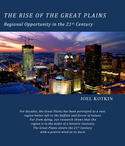Conservatives often fret that Barack Obama is leading the nation toward socialism. In my mind, that's an insult to socialism, which, in theory, at least, seeks to uplift the lower classes through greater prosperity. In contrast, the current administration and its core of wealthy supporters are more reminiscent of British Tories, the longtime defenders of hereditary privilege, a hierarchical social order and slow-paced economic change. read more »
Environment
Green Office Towers Cast Shadow Over Sydney
Known for her spiky hair, studded-collar and heels, Sydney’s Lord Mayor is the epitome of progressive chic. For a green activist, though, Clover Moore attracts some surprising company. Landlords owning 58 per cent of the CBD’s office space have rushed to join her Better Buildings Partnership, an alliance “to improve the sustainability performance of existing commercial and public sector buildings”. read more »
The Ecology of Obesity
Starting in the mid-nineties, ecologically-minded Americans increasingly came to see farmers markets as a way to bring healthy foods to poor neighborhoods, support local organic agriculture, and even address global warming. During the Bush years, major health philanthropies joined these efforts, making new grocery stores their highest priority in combating obesity, which was disproportionately affecting the poor. read more »
Natural Gas Boom: The “Janus” Effect
The last five years have seen a revolution in terms of the amount of inexpensive U.S. natural gas made available for consumption in power plants, road fuels, and as a feedstock for new and expanded petrochemical plants. We are now even debating the advisability of large volume natural gas exports in the form of liquid natural gas (LNG). read more »
How Green Are Millennials?
Besides his history-making embrace of full equality for gays and lesbians, the most surprising part of President Barack Obama’s Second Inaugural Address may have been the emphasis placed on dealing with the challenge of climate change. The president devoted almost three whole paragraphs, more than for any other single issue, to the topic. read more »
The California-China-CO2 Connection
Michael Peevey, President of the California Public Utilities Commission, is sincere and concerned about CO2 emissions. At a recent presentation at California State University Channel Islands, he spoke about California’s efforts to limit emissions. He mentioned green jobs, but, to his credit, he did not repeat the debunked claim that restricting CO2 emissions will be a net job creator. He also acknowledged that it doesn’t much matter what California does, if China doesn’t change its behavior. read more »
What Stifles Good Housing Development?
We can't afford outmoded attitudes in housing development anymore - not as businesses, not as citizens, and certainly not as development professionals. As development consultants, we're often asked to provide detailed input on project design and the marketing of developments throughout the United States and Canada. We usually work with a local team of engineering consultants that provides construction drawings and serves as an intermediary for the project with local governments. read more »
The Rise of the Great Plains: Regional Opportunity in the 21st Century
This is the introduction to a new report on the future of the American Great Plains released today by Texas Tech University (TTU). The report was authored by Joel Kotkin; Delore Zimmerman, Mark Schill, and Matthew Leiphon of Praxis Strategy Group; and Kevin Mulligan of TTU. Visit TTU's page to download the full report, read the online version, or to check out the interactive online atlas of the region containing economic, demographic, and geographic data.
For much of the past century, the vast expanse known as the Great Plains has been largely written off as a bit player on the American stage. As the nation has urbanized, and turned increasingly into a service and technology-based economy, the semi-arid area between the Mississippi Valley and the Rockies has been described as little more than a mistaken misadventure best left undone. read more »
A Geographer Who Navigated the Globe
Many people ask, “What do geographers do?” I would suggest that Marvin Creamer’s life story is all you need to know about the practical application of geography, even though most of us will never be stuck in a horizonless Indian Ocean on a “sea of glass”, or try to navigate the ferocious Drake’s Passage. Ancient mariners may have been able to sail long distances without instruments, but it is difficult, tricky, and can be extremely hazardous. Only one person, New Jersey’s Marvin Creamer, has ever attempted to circumnavigate the globe this way. read more »
As Partisan Rancor Rises, States That Back a Loser Will Be Punished
Never mind the big-tent debate talk from both Barack Obama and Mitt Romney about how their respective politics will benefit all Americans. There’s a broader, ugly truth that as the last traces of purple fade from the electoral map, whoever wins will have little reason to take care of much of the country that rejected them. read more »





















